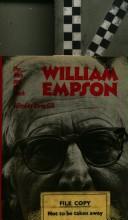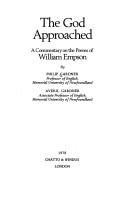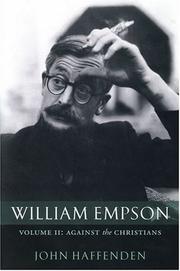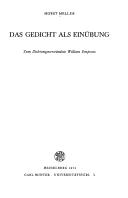| Listing 1 - 10 of 32 | << page >> |
Sort by
|

ISBN: 0710078234 9780710078230 Year: 1974 Publisher: London: Routledge,
Abstract | Keywords | Export | Availability | Bookmark
 Loading...
Loading...Choose an application
- Reference Manager
- EndNote
- RefWorks (Direct export to RefWorks)
Empson, William, --- Empson, William --- Empson, William, - 1906-1984
Book
ISBN: 9781472509703 Year: 2013 Publisher: London New Delhi New York [etc.] : Bloomsbury,
Abstract | Keywords | Export | Availability | Bookmark
 Loading...
Loading...Choose an application
- Reference Manager
- EndNote
- RefWorks (Direct export to RefWorks)
Littérature --- Philosophie. --- Empson, William,
Article
Abstract | Keywords | Export | Availability | Bookmark
 Loading...
Loading...Choose an application
- Reference Manager
- EndNote
- RefWorks (Direct export to RefWorks)

Abstract | Keywords | Export | Availability | Bookmark
 Loading...
Loading...Choose an application
- Reference Manager
- EndNote
- RefWorks (Direct export to RefWorks)
Empson, William --- God in literature. --- Empson, William, --- Criticism and interpretation.
Book
Year: 1969 Publisher: New York : Columbia University Press,
Abstract | Keywords | Export | Availability | Bookmark
 Loading...
Loading...Choose an application
- Reference Manager
- EndNote
- RefWorks (Direct export to RefWorks)
Poets, English --- Critics --- Empson, William,
Book
ISBN: 9780199539918 Year: 2009 Publisher: Oxford : Oxford University Press,
Abstract | Keywords | Export | Availability | Bookmark
 Loading...
Loading...Choose an application
- Reference Manager
- EndNote
- RefWorks (Direct export to RefWorks)
William Empson was the foremost English literary critic of the twentieth century. He was a man of huge energy and curiosity, and a genuine eccentric who remained imperturbable in the face of all the extraordinary circumstances in which he found himself. The discovery of contraceptives in his possession by a bedmaker at Cambridge University led to his being robbed of a promised Fellowship. Yet Seven Types of Ambiguity , drafted while he was still an undergraduate, promptly brought him world-wide fame. Empson invented modern literary criticism in English. He acted too as a cultural fifth-columnist, challenging received doctrine in life and literature. 'It is a very good thing for a poet . . . to be saying something which is considered very shocking at the time,' he maintained. 'To become morally independent of one's formative society . . . is the grandest theme of all literature, because it is the only means of moral progress.' His public life took him through many of the major political events of the modern world -- the rise of imperialism in Japan, the Sino-Japanese war in China, wartime propaganda for the BBC, and the Chinese civil war and Communist takeover of Peking in 1949. His friends and critical sparring partners included I. A. Richards, Kathleen Raine, J. B. S. Haldane, Humphrey Jennings, George Orwell, Robert Lowell, Dylan Thomas, Stephen Spender, Helen Gardner, and T. S. Eliot. 'It is of great importance now that writers should try to keep a certain world-mindedness,' he insisted. 'Without the literatures you cannot have a sense of history, and history is like the balancing-pole of the tightrope-walker . . . ; and nowadays we very much need the longer balancing-pole of not national but world history.' His passionate world-mindedness, and his humanism, combativeness, and wit, are fully in evidence in this, the first of two volumes exploring his remarkable life and work.
Book
ISBN: 9780199539925 Year: 2009 Publisher: Oxford : Oxford University Press,
Abstract | Keywords | Export | Availability | Bookmark
 Loading...
Loading...Choose an application
- Reference Manager
- EndNote
- RefWorks (Direct export to RefWorks)
Following the acclaimed first volume, Among the Mandarins , this is the second and concluding volume of the authorized biography of William Empson, one of the foremost poets and literary critics of the twentieth century. Against the Christians begins during the Second World War and follows Empson's turbulent years of writing wartime propaganda for the BBC. As Chinese Editor, he organised broadcasts to China and propaganda programmes for the Home Service, during which time his friends and colleagues included the prickly George Orwell. The effectiveness of Empson's work for the BBC provoked the Nazi propagandist Hans Fritzsche to call him a 'curly-headed Jew' -- a charge which gave him enormous satisfaction. In 1947 he returned to China, where he was caught up in the Communist siege of the Peking and witnessed Mao Tse-tung's triumphant entry. 'I was there for the honeymoon between the universities and the communists; we were being kept up to the mark rather firmly.' He saw 'the dragooning of independent thought and the hysteria of the confession meetings'. In the late 1940s he also taught in the USA, where he relished the irony of his situation. 'My position here really seems to me very dramatic; there can be few other people in the world who are receiving pay simultaneously and without secrecy from the Chinese Communists, the British Socialists, and the capitalist Rockefeller machine.' From 1953 to 1971 he held the Chair of English Literature at Sheffield, where he engaged more vigorously than ever before in public controversy, being driven by a desire to correct the wrong-headed orthodoxies of modern literary criticism -- most notably 'neo-Christianity'. He acquired massive publicity for his views on the wickedness of Christianity when he published Milton's God in 1961: 'The poem is wonderful because it is an awful warning. The effort of reconsidering Milton's God, who makes the poem so good just because he is so sickeningly bad, is a basic one for the European mind.' Haffenden presents a full account of the work on Milton, along with analyses of Empson's many other writings on subjects including Marlowe, Donne, Marvell, and Coleridge, and The Structure of Complex Words (1951). In a full and candid study of the public and private Empson, John Haffenden enables the reader to understand one of the most gifted, eccentric, witty, and controversial figures of our age -- a giant of modern literature and criticism.

ISBN: 1280758449 0191534846 1429470852 9781429470858 9786610758449 6610758441 0199276609 9780199276608 9781280758447 9780191534843 9780199274408 0199539928 1383042039 0199274401 9780199274406 Year: 2006 Publisher: Oxford New York Oxford University Press
Abstract | Keywords | Export | Availability | Bookmark
 Loading...
Loading...Choose an application
- Reference Manager
- EndNote
- RefWorks (Direct export to RefWorks)
William Empson (1906-1984) was one of the foremost English literary critics of the twentieth century. His public life and travels involved him in many of the major events of the modern world. This compelling account is the second of two volumes exploring his remarkable life and work.
Poets, English --- Criticism --- Critics --- History --- Empson, William,

ISBN: 3533022684 Year: 1974 Publisher: Heidelberg : Winter,
Abstract | Keywords | Export | Availability | Bookmark
 Loading...
Loading...Choose an application
- Reference Manager
- EndNote
- RefWorks (Direct export to RefWorks)
Aesthetics, British. --- Poetics. --- Empson, William, --- Aesthetics.
Book
Year: 1973 Publisher: Berkeley University of California Press
Abstract | Keywords | Export | Availability | Bookmark
 Loading...
Loading...Choose an application
- Reference Manager
- EndNote
- RefWorks (Direct export to RefWorks)
| Listing 1 - 10 of 32 | << page >> |
Sort by
|

 Search
Search Feedback
Feedback About UniCat
About UniCat  Help
Help News
News